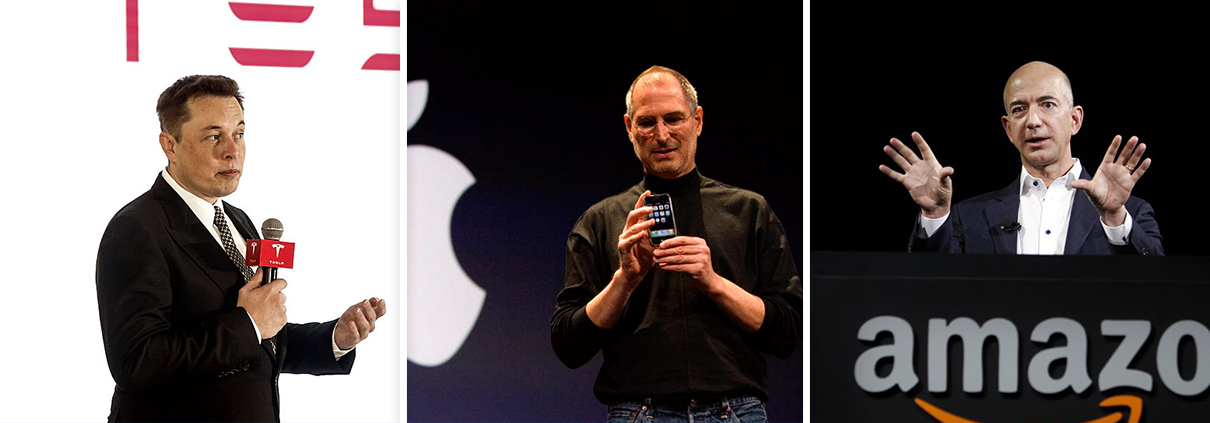Hanging on Every Word
Successful business people of the past and present attain almost mythological status. Note the outpouring of emotion when the anniversary of Steve Jobs’s death rolls around every year. The thoughts and ruminations of today’s high-achieving business superstars are followed via online media and other news sources; we hang on every word hoping for some insight into how we can run our own operations more effectively. So, it is no surprise that two internal memos by Elon Musk and Jeff Bezos have gone viral in recent months. Executives and ordinary folk alike have since picked apart their sentences and analyzed their secret meaning like archaeologists searching for buried treasure. I am no exception. Insights from two modern masterminds are interesting to a humdrum software executive like me as well.
But although I could pick apart every point in those memos like everybody else, I am not going to do it. I am most interested in one area-the bit about striving for excellence and creating a quality product. For the entrepreneurs that changed the course of our country’s history and for the innovators that plug away in 2018, quality has always been key.
Henry Ford: “If I had asked what they wanted, they would have asked for a faster horse.”
Many people know that the author of these famous words is Henry Ford, the inventor of the Model T or “Tin Lizzie” as it was affectionately called. This was the first mass-produced car that everyone wanted, and many could afford. Although Mr. Ford was on the verge of changing forever how people traveled in the early 1900s, he still wanted to do the job right. He brought the brightest engineers to Detroit and paid his workers the highest wages in the country. He said of his goals: “I will build a car for the great multitude. It will be constructed of the best materials, by the best men to be hired, after the simplest designs that modern engineering can devise.” Ford had a corner on the market for the first assembly-line produced car the world had ever known. He could have slapped together a machine that was far less well designed, but he stuck to his principles. “Quality means doing it right when no one is looking.”
Elon Musk’s Tesla: The Electric Model T?
Elon Musk’s work ethic and vision are already legendary. How many people do you know that have launched ambitious business ventures for travel both in space and on earth before the age of 60? Musk is operating under a rigorous performance standard and the waiting list for the Tesla Model 3 is a symptom of his fierce perfectionism. In his most recent memo to Tesla employees, Musk was clear about goals.
“Our car needs to be designed and built with such accuracy and precision that, if an owner measures dimensions, panel gaps, and flushness, and their measurements don’t match the Model 3 specs, it just means that their measuring tape is wrong.”
In other words, Tesla sets the benchmark for quality with the accuracy of the finest Swiss timepiece.
Steve Jobs’ Code of Conduct
Steve Jobs’ craft was in an entirely different field, but his vision was as uncompromising: “When you’re a carpenter making a beautiful chest of drawers, you’re not going to use a piece of plywood on the back, even though it faces the wall, and nobody will see it. You’ll know it’s there, so you’re going to use a beautiful piece of wood on the back. For you to sleep well at night, the aesthetic, the quality, has to be carried all the way through.” Steve Jobs is known for revolutionizing the era of the personal computer, creating devices that are as indispensable as they are elegantly simple and intuitively designed.
Bezos: Recognize Quality Work with Constant Exposure
In order to effect high standards of performance, Jeff Bezos of Amazon fame wants his employees to be able to recognize quality work. Frequent exposure to work of a high caliber helps people to strive for that standard and these standards, according to Bezos, can be learned. He writes that, “much of the time, readers react to great memos very similarly. They know it when they see it. The standard is there, and it is real, even if it’s not describable.”
To actually achieve these standards, Bezos writes that employees need to be realistic about what is achievable in light of time constraints. Working at a high level requires an understanding of what is involved and what is doable. Often excellence requires review by several people and multiple revisions and drafts. In the end, Bezos writes, “(a) culture of high standards is protective of all the ‘invisible’ but crucial work that goes on in every company.” This is how Bezos ensures that a standard of excellence informs all work processes and work product.
In an age where it couldn’t be easier to make a quick buck with countless online venues, it becomes even more important to distinguish your product with high quality. These entrepreneurial giants of the past and present live and breathe by this standard and their commitment shows.





















